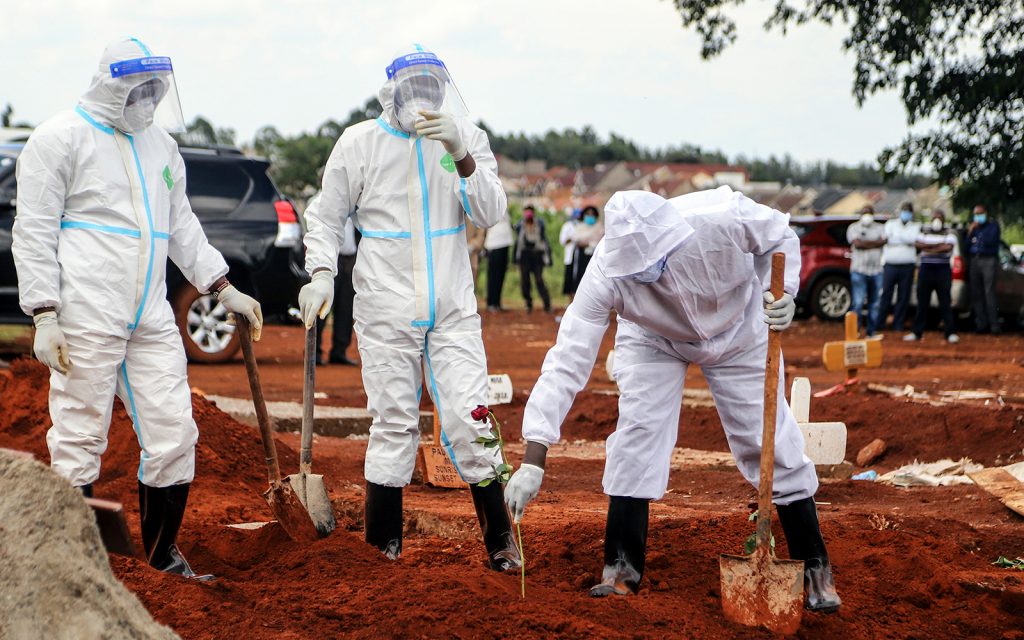Third wave breaks Covid deaths record
The Covid-19 third wave has killed 1 027 people in three months, exceeding the 982 total deaths recorded in the second wave which lasted for six months, Ministry of Health statistics show.
While Public Health Institute of Malawi (Phim) head of epidemiology and surveillance Annie Mwale blamed the surge on the delta variant which was more aggressive than previous waves, health rights activist Maziko Matemba has attributed it to ill-preparedness.

Mwale has since warned that the figures could rise further.
She said: “The second wave statistics cover a period between mid-December and mid-June while the third wave started in mid-June through to September.”
The public health specialist said in the second wave, Covid-19 spread rapidly in the early stages with the peak positivity rate at 36 percent while in the third wave it has been gradual with the highest positivity rate at 26 percent.
Positivity rate is the percentage of all performed corona virus tests that actually turn out to be positive.
Said Mwale: “The other difference is that the second wave was concentrated in urban areas while the third wave was prevalent even in the districts.
“What we are learning from the fatalities and transmissibility is that if there are future waves, they may be more fatal. Therefore, as a country, we need to vaccinate many people and improve on preventative measures.”
She said the second wave had 28 807 confirmed cases and 1863 admissions while the ongoing third wave has so far affected 26 127, with 2 696 admissions recorded.
Mwale said the rise in admissions may not “necessarily be due to pandemic being more contagious but, unlike in the past, we created more space for those in critical conditions.”
A Nation on Sunday analysis done in collaboration with data scientist Tiwonge Msulira Banda of UbuntuNet Alliance shows that the highest number of deaths in the second wave was 457 recorded in January whereas the lowest was seven in May.
In the third wave, the highest fatalities were registered in August at 543.
In the second wave, the highest positive tests were 17 301 recorded in January whereas in the third wave, July registered the highest positive tests at 16 221, the data analysis shows .
Meanwhile, Matemba has expressed surprise that fatalities increased in the third wave when the country would have been better prepared to deal with the pandemic having undergone two other waves before.
In an interview this week, the health rights activist also observed that unlike in the first and second waves, government did not allocate enough resources towards the fight against Covid-19.
He said: “Our expectation was that we would experience a few deaths in the third wave since we learnt some lessons in earlier waves. So, increasing fatalities were mainly due to our ill-preparedness than anything else. There was low awareness on immunisation resulting in some vaccines expiring.”
But Ministry of Health spokesperson Adrian Chikumbe disputed that the rise in fatalities in the third wave was due to lack of preparedness, saying government was more organised in the third than previous waves.
“This time around, hospitals were well stocked with gas and oxygen and defibrators, among other equipment, and the workforce awas also beefed up,” he said.
Going forward, the ministry spokesperson said the country will still enforce prevention measures to reduce the impact of a fourth pandemic breakout which he warned could be more devastating.
Chikumbe said the ministry has changed its immunisation strategy having observed the slow uptake of the vaccines.
He said: “Instead of waiting for people to go to the facilities for the vaccine, we are taking the vaccine to people and it is working very well.”
The Covid-19 figures by the ministry shows that 448 000 have so far been vaccinated in the country. Government targets to vaccinate 11 million by December next year.





